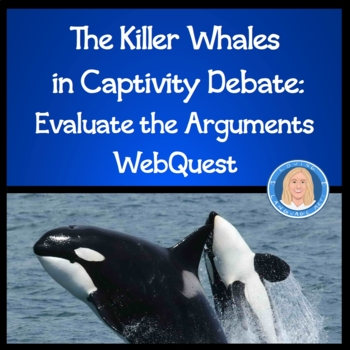WebQuest Evaluating Argument Claims, Evidence, Reasoning: Captive Orcas Debate
- PDF
- Google Apps™
- Internet Activities
- Webquests

What educators are saying
Description
Updated in 2020 as a distance learning WebQuest in Google Slides (and still in PDF) while the debate continues (killer whales continue to be sold worldwide in worse-than-ever conditions, plus think about the other marine mammals). Authentic, relevant, in-depth argument examination! Truly delves into both sides of this hotly debated issue by examining and analyzing multiple primary sources.
Step-by-Step guided activity leads students to read and analyze claims, counterclaims, and evidence presented by scientists, corporate leaders at Sea World, and activists. Extremely thorough in presenting claims and counterclaims from BOTH sides of the debate. Students will be truly engaged and active in learning, especially distance learning. STILL RELEVANT!
This is EXACTLY what creators of the Common Core College and Career Ready Reading Informational Text, Reading in Science & Technical Subjects Standards, not to mention Reading in History/Social Studies Standards wanted students to learn how to do! Wow!!! This is exactly the kind of critical thinking and in-depth analysis of real-world documents they want students to know how to do!
You may think this argument is over, but it's not, and even if it were, this is the PERFECT argument to have students study because it has it ALL: claims, counterclaims, accusations of fallacious reasoning, sufficient evidence, two opposite viewpoints. It is actually really hard to find an argument that has all these elements.
The argument is still relevant. Marine mammals continue to be sold and kept in captivity worldwide in worse-than-ever conditions! Can be paired with the popular documentary Blackfish.
So engaging! Students first read a background informational text passage that explains the debate about keeping killer whales, also known as orcas, in captivity - an argument that heated up in 2013 due to the documentary film "Blackfish" that was released that year. Then, they will read through two lists: claims made AGAINST keeping killer whales in captivity and claims made FOR keeping killer whales in captivity. Next, students will be guided to read through multiple primary source documents online, including a groundbreaking paper written by a PhD scientist that builds on several decades of research about captive marine mammals. Plus they read what Sea World says in response.
Relevant to the Real World! As they read these documents, students identify and evaluate claims and evidence. They cite textual evidence as they analyze. They identify false statements and fallacious reasoning. Finally, they read and summarize a proposal by an expert in the field who comes up with an idea she believes would help phase out keeping killer whales in captivity at marine theme parks. And they find out the latest news on the debate, not just here in the United States where things have gotten better but out there in the world where things have gotten worse for killer whales.
AND CHECK OUT LOVINGLANGUAGEARTS.COM FOR FREE, SELF-GRADING, INTERACTIVE TEST PREP, SEASONAL LESSONS, FREEBIES, AND MORE
----------------------------------------------------------------------------------------------------------------------------
YOU'LL ALSO LIKE THESE GRADE-SPECIFIC RESOURCES:
High-Interest Informational Text Passages paired with COMPREHENSION TASKS or PRACTICE TESTS. Aligned to EVERY SINGLE GRADE-SPECIFIC READING INFORMATIONAL TEXT STANDARD (AND MORE). You won't find these anywhere else! Save yourself hours of internet searches trying to find the right texts for the right goals of the right lengths in the right formats at the right levels. Students keep reporting how much THEY LOVE the passages because they are interesting and relevant to them! GET YOURS NOW!
4th Grade High-Interest Informational Texts and PRACTICE TESTS
4th Grade High-Interest Informational Texts and TASKS
5th Grade High-Interest Informational Texts and PRACTICE TESTS
5th Grade High-Interest Informational Texts and TASKS
Upper Elementary Bundle High-Interest Texts and PRACTICE TESTS
Upper Elementary Bundle High-Interest Texts and TASKS
6th-8th Grade High-Interest Informational Text Passages and TASKS - Volume I
6th-8th Grade High-Interest Informational Texts Passages and TASKS - Volume II
6th Grade High-Interest Informational Texts and PRACTICE TESTS
7th Grade High-Interest Informational Texts and PRACTICE TESTS
8th Grade High-Interest Informational Texts and PRACTICE TESTS
Middle School Bundle High-Interest Texts and PRACTICE TESTS
Middle School Bundle High-Interest Texts and TASKS
9th Grade High-Interest Informational Texts and PRACTICE TESTS
9th Grade High-Interest Informational Texts and TASKS
10th Grade High-Interest Informational Texts and TASKS
10th Grade High-Interest Informational Texts and PRACTICE TESTS
11th Grade High-Interest Informational Texts and TASKS
11th Grade High-Interest Informational Texts and PRACTICE TESTS
12th Grade High-Interest Informational Texts and TASKS
12th Grade High-Interest Informational Texts and PRACTICE TESTS
High School Bundle High-Interest Texts and TASKS
High School Bundle High-Interest Texts and TESTS
Note About the Practice Tests: The test items contain a variety of question types similar to SBAC, PARCC, STAAR, CAASP, and all of the state standardized ELA assessment programs. The tests align to even more standards: Writing, Language, Speaking & Listening, Literacy in Science and History, etc. Items align specifically to the grade level, not just generally. ALL TEXT-EVIDENCE BASED
----------------------------------------------------------------------------------------------------------------------------
Test Prep Workbooks Prepare Students For:
Alabama ARMT, Alaska SBA, Arizona NAEP, AzM2, AASA Arkansas AABE, California CAASP, STAR & SBAC, Colorado CMAS & CSAP, Connecticut CMT & CAPT, Delaware DCAS & DSTP, Washington, DC PARCC, Florida FSA & FCAT, Georgia CRCT, Hawaii HSA, Idaho ISAT, Illinois ISAT, Indiana ISTEP+, Iowa ITBS & ITED, Kansas KRA, Kentucky CATS & KCCT, Louisiana LEAP & ILEAP, Maine NECAP & MEA, Maryland MSA, Massachusetts MCAS, Michigan MEAP, Minnesota MCA II, Mississippi MCT & MFLE, Missouri MAP, Montana MontCAS, Nebraska NeSA, Nevada NPEP, New Hampshire NECAP, New Jersey PARCC, New Mexico NMSBA, New York Regents NYSE & NYSTP, North Carolina EOG, North Dakota CAT & NDSA, Ohio OAT & OST, Oklahoma OCCT, Oregon OAKS, Pennsylvania PSSA, Rhode Island RICAS & NECAP, South Carolina PASS, South Dakota DSTEP, Tennessee TCAP, Texas STAAR & TAKS, UTAH SAGE & UPASS, Vermont SBAC & NECAP, Virginia SOL, Washington WCAP & WASL, West Virginia WESTEST, Wisconsin WKCE, Wyoming PAWS





